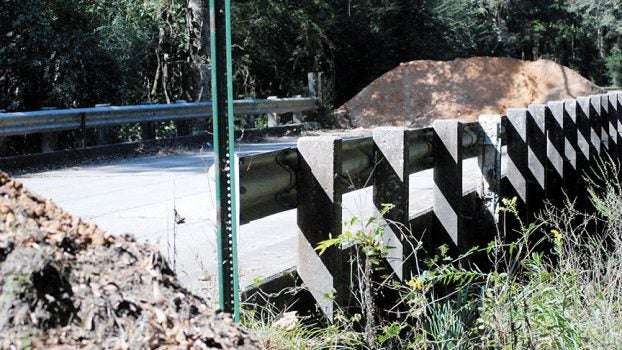Failing bridges cost Lincoln County
Published 12:06 am Saturday, October 14, 2017
County crews piled up dirt and gravel at both ends of Bridge No. 241 Friday morning, blocking a section of Mt. Zion Road over the Bayou Pierre tributary about 1,500 feet from I-55.
A driver turning off the interstate to get to Mt. Zion Baptist Church at lunch time was stopped by a road closed sign and forced to turn around. Don Presley said he’d need to drive miles out of his way to travel what shouldn’t take him but a few minutes.
“A lot of us use it coming up the interstate and then get off here so we can go instead of going up through all the country roads,” he said. “It’s going to inconvenience me. I’m going to have to ride down about four miles to the truck stop and go across.”
Presley, a retired coach from Loyd Star, remembers a few times when storms brought in enough rain to flood the creek and cover the bridge with water. All that wear and tear on the timber pilings has caused enough damage to prompt inspectors to close a few already and bring it down to one lane on a few more.
Presley saw inspectors working at some other bridges this week.
“I knew if they went under there they were going to find something that needs to be replaced,” he said.
After seeing a photograph of two cracked timber pilings under the concrete bridge, Presley wasn’t convinced he wanted to cross it until it’s repaired.
“It’s time to fix this one. It’s really dangerous,” he said.
The bridge is one of about 60 timber-component bridges that will be inspected following mandates from the Federal Highway Administration. Lincoln County has 108 timber-component bridges, the second-highest in the state.
Until recently, Lincoln County supervisors controlled the roads and bridges in their districts and made their plans for maintenance and replacements based on recommendations from Ryan Holmes, the county engineer who also works for Dungan Engineering in Brookhaven.
“Before these inspections of county bridges with timber components, the county engineer in each county performed the inspections, recommended repairs, posting or closure,” Holmes said.
According to Holmes, four Lincoln County bridges are currently under construction for replacement and the county has plans in place to replace approximately 20 bridges in the next 18 months, which would be paid for with a combination of local money, state aid and money from the Local System Bridge Program. The LSBP was created by the Mississippi Legislature in 1994 to provide $20 million each year to counties in support of maintaining local bridges. However, even that funding is declining, as state legislators voted to not fund the LSBP during the 2017 legislative session.
“The number of bridges could increase if the funding were to increase and if new funding is acquired whether through grants or new funding sources,” he said.
Supervisors recently passed a $5 million bond to help with maintenance costs, however, the loss of state aid money to pay for the federally-mandated inspections will eat into their budget, said District 3 Supervisor Nolan Williamson.
He said it’s ridiculous to think that counties are expected to maintain bridges and roads with the funds they’re allotted. Then they’re punished by calling for inspections at $10,000 to $15,000 a pop which will come out of the state aid money that was already stretched too thin, he said.
“While Mississippi counties are struggling to maintain the majority of our state’s infrastructure with failing state and federal support, the Federal Highway Administration has decided that Mississippi counties should be run like Washington, DC, by mandating the re-inspection of approximately 2,300 county timber bridges, and requiring the inspections to be completed by independent engineering firms, at a cost of up to $31.5 million,” wrote Derrick Surrette, executive director of the Mississippi Association of Supervisors, in a letter sent Oct. 11 to Sen. Thad Cochran, Mississippi legislators and county supervisors. Holmes said nine firms are completing the inspections throughout the state.
“The Mississippi Department of Transportation and Office of State Aid Road Construction have awarded contracts for the Federal Highway Administration-mandated re-inspections, including contracts with engineering firms as far away as New York. Our counties currently inspect each of the 2,300 timber bridges annually using certified engineering firms here in Mississippi at a cost of only $805,000,” Surrette wrote.
He estimates the “Washington, DC, way of inspecting county bridges” will cost Mississippi taxpayers 39 times more.
“County boards of supervisors have sovereign authority over all locally-owned roads and bridges, yet county supervisors had no input regarding these million dollar contracts that were awarded,” he said. “Now counties are being mandated to pay for these high-cost re-inspections and are being forced to close bridges found to be outside new federal guidelines which have not been shared with our counties.”
Williamson said he agrees with Surrette when he says this federal decree is “a perfect example that Washington, DC is broken and out of touch.”
The supervisor said that Lincoln County needs assistance and additional funding to maintain and build roads and bridges. He said that although some bridges in Lincoln County have timber-components that need to be replaced, the other timber pilings along the span of each bridge adequately distribute the weight. In some cases, when advised by Holmes following an inspection, they have reduced the weight-limit on a bridge until repairs can be made.
That’s better than closing them completely, he said.
The Federal Highway Administration did not talk to supervisors about the mandate, he said, and has not explained their new guidelines to counties.
More importantly, Surrette said, no federal funds are being used to pay for the federal-mandated inspections and no additional federal funds are available to make the necessary bridge repairs.
“The lack of communication, transparency and efficiency from the FHWA is going to cripple Mississippi counties’ ability to maintain our bridges,” he said.
Nancy Singer, a spokeswoman with the FHWA, which is under the U.S. Department of Transportation, said the Federal Highway Administration oversees the National Bridge Inspection Program, which is dedicated to ensuring bridges are safe for the traveling public.
“Working with FHWA division offices, state transportation departments, and federal agencies, thousands of qualified inspectors from the program evaluate the condition and safety of the nation’s bridges every day. Bridges are inspected on a routine basis, typically every 24 months, and the results are reported to FHWA,” she said. “If a bridge is deemed unsafe, immediate action is taken, which could include closure, prompt repair, or load posting.”
FHWA maintains the National Bridge Inspection Standards, which are federal regulations for bridge inspections that states and federal bridge-owning agencies are required to follow. The NBIS apply to all highway bridges — but does not include rail, transit or pedestrian bridges — on all public roads.
According to Michael Flood, the public information officer for MDOT, the agency is responsible for the state-owned highway system. The Office of State Aid Road Construction is responsible for the locally-owned system. The Office of State Aid reports directly to the governor. MDOT reports to the elected Mississippi Transportation Commission.
“In other words, MDOT and SA are two completely separate entities,” he said. “MDOT bridge inspectors were a part of a team that did some of the initial inspections. This team included inspectors from the Federal Highway Administration, as well as representatives from State Aid and the county. However, MDOT has completed its responsibility with the bridge inspections, and will no longer be involved.”
Lanney Glover, assistant State Aid engineer, said bi-annual inspections are part of the National Bridge Inspection Program.
“County engineers have been doing this for a long time,” he said.
The FHWA data showed that ratings for Mississippi was low. The state had more 2 ratings than any other state that had bridges open to traffic, he said.
“They said, ‘Let’s have some more looking at them,’” he said.
Glover said the cost of the inspections will come out of whatever state aid funding the county would have received.
“It’s a fixed pot of money,” he said.
The problem, Williamson said, is that the pot will be empty when it gets to the counties. Even with adequate funding, the bureaucratic red tape counties must cut through to get a bridge repaired can cause at least a two-year timeline from start to finish, he said. If they’re paying for the inspections too, he doesn’t anticipate bridges to be reopened anytime soon.
Glover understands that upcoming projects supervisors have planned will probably be put on hold. He said FHWA could withhold federal funds from MDOT and state aid if the inspections are not completed.
“They say it has to be done,” he said.
Rep. Becky Currie, R-Brookhaven, said MDOT is not to be held without fault in this situation.
“MDOT came to the Legislature saying the local engineers are just trying to make more money by doing these inspections and then also doing the work,” she said. “Obviously MDOT is the one that wanted to make more money so they gave us bad information.”
She said local engineers were paid $300 to $400 to inspect bridges, while the federally-mandated inspections come with a $10,000 to $15,000 price tag.
She recommends that the entire landscape of the Department of Transportation needs to be changed.
“There are a lot of good, hardworking people at MDOT and this is not their fault,” she said. “Right now, how MDOT decides to spend their money is a mystery without any clue. We spend $1.2 billion a year or more and who decides how and where we spend it? When I try to talk to MDOT about projects, they say that it is federal money, ‘You don’t have to worry about it.’ Guess what MDOT, my constituents and I pay federal taxes and we still want answers.’”
Currie said that she has spoken to the Speaker of the House Philip Gunn and Rep. Charles Busby, R-Pascagoula, chairman of the transportation committee, to voice her concerns.
“I am just furious about this,” she said. “This has to be fixed in the upcoming session.”
Rep. Vince Mangold, R-Brookhaven, said the need for the costly inspections doesn’t add up.
“I don’t know why it costs so much and why we have to have outside engineers do that,” he said. “Does MDOT not have engineers?”
He said county supervisors are being forced to do more with less and less.
“That’s what’s crazy,” he said. “Already, they say they’re behind the eight ball to be able to do what they need. I’m trying to ask questions and find out. I’m hoping that things will change when we get into session. It’s not just Lincoln County. It’s all over Mississippi.”
Mangold said most of the people he’s talked to wouldn’t mind paying an additional user fee on gasoline.
“Most folks that I talk to would gladly pay extra if they had some type of guarantee that the money they paid would be going to roads and bridges,” he said. “They don’t want to pay extra and have that go into an MDOT general fund.”
Sen. Sally Doty said she is looking for a solution that would create safe roads for taxpayers.
“This is a problem that did not occur overnight and won’t be fixed overnight,” she said. “I certainly recognize the seriousness and safety issues involved and am discussing and listening to many different ideas on solutions for the entire infrastructure issue.”
The legislative session begins Jan. 2.







